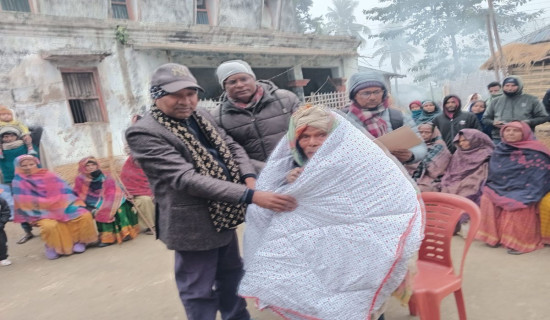- Thursday, 8 January 2026
Protecting Earth's Atmosphere
Jhabindra Bhandari
The global environment is changing. The health of our planet is at risk. This is because we are enormously faced with climate change crisis, declining biodiversity, shortages of arable land, fresh water, pollution, and biogeochemical flows in the recent years. More importantly, human health and the health of our planet are closely linked.
As there are increasing evidences of degrading natural systems, protecting planetary health is increasingly considered as a matter of concern in human history. And the long-term consequences on human health are more diverse and profoundly visible.
Planetary health is largely a solutions-oriented, transdisciplinary field and social movement focused on analysing the impacts of human disruptions to earth’s natural systems on human health. More importantly, it is rooted in the indigenous knowledge and wisdom that our lives are intertwined with the land we live on. Therefore, it largely considers the health and well-being of people and the planet's natural systems.
Climate change
Undoubtedly, our life is largely dependent upon the earth, and the quality of our environment is obviously determined by our actions. The growing environmental changes, such as global warming, water scarcity, and pollution have enormous impacts on human health. More specifically, climate change creates global threats that affect all aspects of human life including our health, homes, livelihoods, and cultures, as well as our physical environment.
According to the WHO, climate change affects the social and environmental determinants of health – clean air, safe drinking water, sufficient food and secure shelter. Between 2030 and 2050, climate change is expected to cause approximately 250, 000 additional deaths per year, from malnutrition, malaria, diarrhea and heat stress. In addition, climate change poses a significant challenge for communities in developing countries. Poor and socially marginalised communities will be differentially affected, depending on their relationship to the environment and the contextual political and socioeconomic conditions at large.
Therefore, it is high time to look for solutions which generate policies that creatively articulate multiple perspectives among global actors on the causes, effects, adaptations, resiliencies and vulnerabilities associated with climate change that are embedded in global, national and local development priorities.
In the changing context, urban planning, risk governance and resilience have become increasingly important pathways to promoting and protecting public health at local level. Unfortunately, the increasing trends of urbanisation and environmental degradation have left many cities vulnerable to disasters and health emergencies. The recent COVID-19 pandemic has further revealed the inextricable links between health and urban environments, and urgency of robust preparedness and response to protect human health in emergencies.
In the recent years, One Health is an integrated approach that aims to seek a sustainable balance between the health of people, animals and ecosystems. This approach primarily seeks to optimise the multi-sector engagement to enhance social well-being and tackle threats to health and ecosystems. In this context, more efforts are needed for securing clean water, energy and air, safe and nutritious food that are key to sustainable human development.
On the other hand, neglected tropical diseases (NTDs) survive and thrive on poverty. They are mostly prevalent in the areas with unsafe water, poor sanitation and limited access to basic health services. Unfortunately, the NTDs affect the poorest people, often living in remote, rural areas, urban slums, or areas of natural disaster.
Considering the emerging needs of protecting planetary health, the critical role of governments, civil society, health workers and health facilities needs to be significantly enhanced for concrete actions. Political leaders and policy makers need to address the critical issues of planetary health in their national health policies, strategies and action plans for effective implementation in a participatory and inclusive approach.
New national strategic interventions are urgently needed to reduce air pollution levels to lower the burden of disease from stroke, heart disease, lung cancer, and both chronic and acute respiratory diseases, including asthma. In the urban settings, local governments can help build cities with green spaces that promote physical activity and mental health. While the tobacco enormously pollutes the planet and our lung, the governments can help create smoke free cities.
They need to devise policies on sustainable waste management and reduction of plastics in urban areas. Similarly, public policies on agriculture subsidies towards sustainable and healthy production can be instrumental in protecting human health from environmental degradation. While most cities in developing countries are becoming more compact, there are emerging needs to promote energy efficient buildings, engage low-carbon public transport, ensure sanitation and water supply, protect biodiversity and create new parks and gardens.
Concerted efforts
Moreover, partnering with local business community is an important strategy to regulate the marketing of unhealthy foods and beverages in public spaces. In the health facilities, there are critical needs of concerted efforts to reduce health care waste and identify new opportunities for saving energy. Community awareness of protecting planetary health can greatly help to enhance human health and social well-being.
Planetary health needs concrete ideas and solutions that seek to engage multiple sectors in protecting the human health.There are numerous examples of how communities are creating new ways to use the planet’s resources wisely to protect their health and ways that can serve as a model for others.
To sum up, it is our collective responsibility to build a world with clean air, safe water, and sanitation, where healthy food is available to all, cities are livable, economies are climate-resilient and focused on health and well-being.
(PhD in global health, Bhandari writes on health and development issues)

















